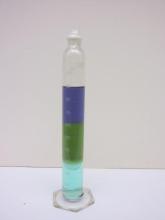Density Column Version 1
Summary
3 immiscible liquids of different densities are in a sealed cylinder.
Chemicals and Solutions
- Bis(2-chloroethyl)ether
- Water
- Mineral oil
Materials
One large cylinder with the above mentioned liquids
Procedure
This is a display. The column consists of 3 liquid layers with dyes. The cylinder can be shaken and it will separate over time. The order of density from least dense to most dense is:
| Liquid/Solid | Density in g/mL or g/cm³ |
| Bis(2-chloroethyl) ether | 1.456 |
| Water | 0.998 |
| Mineral Oil | 0.8 |
Hint
It takes a while to separate fully. If you shake the cylinder, do so early in the lecture.
References
Shakhashiri Chemical Demonstrations Vol 3 pg 225, 1989, The University of Wisconsin Press, Madison Wisconsin
Density Column 2


Summary
Three level density column is made in class.
Hazards
- Iodine can cause burns.
- Chloroform is a possible carcinogen
- Copper Sulfate is an irritant
Chemicals and Solutions
- Ethyl Acetate
- Water
- Chloroform
- Iodine
- CuSO₄
Materials
- 2 Ungraduated Cylinders
- deflagrating spoon
Procedure
Two Ungraduated cylinders will be provided with the three liquids inside.
| Liquid | Density in g/mL or g/cm³ |
| Ethyl acetate | 0.897 |
| Water | 1.00 |
| Chloroform | 1.48 |
Using the deflagrating spoon Copper Sulfate is added to the aqueous layer (center) and gently stirred. Copper sulfate is only miscible in the aqueous layer and will show a floating blue layer. Iodine is then added to the other cylinder which is miscible in the organic layers. An orange and red solution will be separated by the colorless middle aqueous phase. The iodine and copper sulfate will then be added to the corresponding cylinder to make an orange/blue/red column.
Hint
Do not mix the organic layers as they are miscible.
Disposal
Organic layers will be combined and sent to EH&S as 1%iodine 99% Ethyl acetate/chloroform. Aqueous layer will be sent as 1% CuSO₄ and 99% water.
